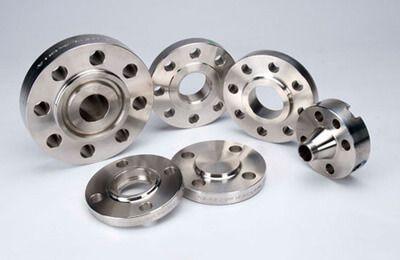Flanges are essential in piping, connecting pipes, valves, and other equipment that transport fluids or gases. A flange provides a leak-proof seal, easy access for maintenance and repair, and structural support to the pipeline. However, flanges are also prone to corrosion, especially in harsh environments, where corrosive media, high temperature and pressure, and frequent thermal cycling can damage the metal surface, weaken the joint, and cause leakage or even catastrophic failure.
Manufacturers use various materials and coatings to prevent corrosion, such as stainless steel, carbon steel, PVC, rubber, epoxy, or galvanized zinc. However, none of these materials can withstand the extreme conditions that high nickel alloy flanges can. High nickel alloys are unique materials that offer exceptional resistance to corrosion, high temperatures, and mechanical stress, making them ideal for critical applications in the chemical, petrochemical, oil and gas, power generation, and marine industries.
What are High Nickel Alloys?
As the name suggests, high nickel alloys contain a high percentage of nickel, usually above 30%, along with other elements like chromium, molybdenum, iron, copper, titanium, and cobalt. These alloys are nickel-base, superalloys, or high-performance alloys, depending on their composition, microstructure, and properties.
High nickel alloys are renowned for their excellent corrosion resistance, as nickel is a noble metal that forms a protective oxide layer on the surface, preventing further corrosion. Moreover, nickel alloys exhibit high strength, toughness, ductility, and creep resistance at elevated temperatures thanks to solid solution strengthening, precipitation hardening, and grain boundary strengthening mechanisms. Some nickel alloys can also resist thermal shock, wear, erosion, and fatigue, making them suitable for the most demanding applications.
Why Choose High Nickel Alloy Flanges?
Flanges made of high nickel alloys offer several advantages over conventional flanges, including:
Corrosion resistance: High nickel alloys are mostly immune to various forms of corrosion, such as pitting, crevice, intergranular, stress corrosion cracking, and corrosion fatigue caused by acids, alkalis, salts, and chlorides. This makes high nickel alloy flanges ideal for aggressive environments where other materials fail.
Temperature resistance: Nickel alloys can withstand high temperatures up to 1000°C or higher without losing their strength, ductility, or resistance to corrosion. This is essential for chemical, petrochemical, or power generation applications, where heat exchangers, boilers, and reactors operate at extreme temperatures.
Mechanical strength: High nickel alloys have excellent mechanical properties, such as high tensile and yield strength, good flexibility and toughness, and good fatigue and creep resistance. This makes high nickel alloy flanges suitable for high-pressure and high-stress applications, such as offshore platforms, submarines, and aircraft engines.
Compatibility: High nickel alloys are compatible with various piping materials, including stainless steel, carbon steel, and titanium. This allows them to be used in various applications without compromising the system’s integrity or causing galvanic corrosion.
Durability: High nickel alloys are durable and long-lasting thanks to their excellent corrosion resistance and mechanical properties. High nickel alloy flanges require less maintenance and replacement, reducing downtime and costs.
Conclusion:
High nickel alloy flanges are the ultimate solution to corrosion resistance, offering unparalleled performance in harsh environments. High nickel alloys provide excellent corrosion resistance, temperature resistance, mechanical strength, compatibility, and durability, making them ideal for critical applications in various industries. When choosing flanges for your piping system, consider using high nickel alloy flanges to ensure long-lasting and reliable performance.


